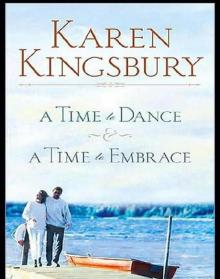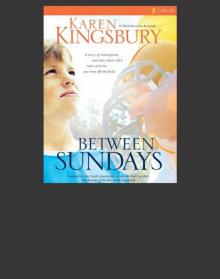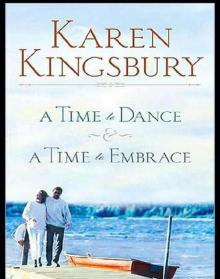- Home
- Karen Kingsbury
Rejoice Page 4
Rejoice Read online
Page 4
If their marriage survived long enough to find out.
Dr. John Baxter couldn’t concentrate on anything but Hayley’s vital signs.
By seven o’clock that night they were all at the hospital except Erin and Sam, who had already returned to Texas. But other than Peter and Brooke, only John understood the gravity of the situation. He sat in the waiting room glancing every now and then at the others. Elizabeth beside him, Ashley next to her, and Luke at the far end of the sofa. Luke was set to leave Monday for New York, and already he’d called Reagan and explained the situation, that he might wait and travel after they knew more about Hayley’s condition.
Across the room sat Kari and Ryan, the glow from their honeymoon dimmed in light of this tragedy. Brooke and Peter were in with Hayley. The children, Cole and Maddie and Jessie, were across town with Pastor Mark and his wife.
None of them talked about what had happened or how long Hayley had been under or who was at fault. In fact they’d said very little, each of them too deep in prayer and fear to think of anything to say.
John had called the pastor a few minutes earlier and given his friend an update. “It doesn’t look good.” He pinched the bridge of his nose and squeezed his eyes shut. “She could’ve been under fifteen minutes or more.”
“Oh, John . . .” The man didn’t say anything else. What could he say? He didn’t need a medical degree to understand how serious her condition must be if she had been underwater that long.
“She still isn’t breathing on her own.” John’s throat was thick, and he waited until he had more control. His mind kept screaming the obvious. Hayley might survive. But depending on the damage in her brain, she would almost certainly not live any kind of normal life. “Pray for her, Mark . . . for God’s will.”
“I’m praying for a miracle.”
“Right.” A knifepoint of guilt nicked John in the gut. “That’s what I mean. Pray for a miracle.”
But now, ten minutes later, John wasn’t sure.
If she lived . . . if her brain didn’t swell in the coming days, and if somehow her mind figured out how to breathe again, exactly how much of Hayley would remain? He shuddered and remembered a boy who had come into the hospital a few years earlier. The child—a two-year-old—had fallen into a muddy part of the river, where he was under twelve minutes before his desperate parents bumped into him and ran him to their car.
Friends and relatives gathered around the hospital in the days afterwards, praying for the boy to survive, and sure enough he did. But he left the hospital two months later an entirely different child. Unable to see or speak or move his limbs, the child was doomed to spend the rest of his life being tube fed, strapped to a bed or a wheelchair.
And John had wondered.
Wouldn’t the child have been better off in heaven? Why would God allow him to live, only to confine him to a paralyzed mind and body? to deny him the chance to run and play and live a normal life? The incident was so troubling, John had never actually resolved it. Instead he’d put it out of his thinking until now, until he and his family were the ones praying desperately for life, begging God for Hayley’s next breath.
He hung his head and laced his fingers along the back of his neck. Don’t do that to her, God. . . . If you bring her back, bring her back all the way. Anger welled within him, and he wanted to grab the nearest magazine and throw it across the room. He was a doctor, after all. A doctor! And here he was completely helpless to do anything for his little granddaughter.
God . . . I want her to live. . . . He worked his fingers into his neck muscles. But if she won’t be the same . . . if Hayley isn’t Hayley anymore, if she can’t play with Maddie or recognize Brooke—then God, maybe it would be better if you—
“John?”
“Yes . . .” He looked up and saw one of his colleagues at the door. Dr. Zach Martinez specialized in brain injuries; the two of them had finished med school together and started practicing in Bloomington the same year.
The man’s face was grim. “Could I speak to you?”
John gave Elizabeth a look as he stood and followed the doctor out of the room. When they were a ways down the hallway, Zach turned to him and pursed his lips. “The situation isn’t good, John. You know that.”
“Yes.” John’s knees shook. His arms hung weak at his sides. “Can you tell anything about her brain yet?”
“It’s damaged.” The doctor breathed hard through his nose. “We can see that much.”
“Meaning?” John was playing two roles today, doctor and grandfather. But here and now he wanted Zach to see him as a doctor, someone who could be trusted with the news, no matter how bad.
“She has severe brain damage, John.”
John took the news like a bullet, the sensation so strong he staggered back a step. “Severe?”
“Yes.” He clenched his jaw. “But that’s not the worst of it. Honestly, the team wanted me to ask you about . . .”
John searched the man’s face. The hallway was spinning, and he took hold of the railing that lined the wall. “About what?”
“Whether the family would consider organ donation.” Zach held up a hand. “I know it’s too soon, but if she dies, John, we need to know what to do.”
The floor fell away, and John tightened his grip on the safety railing. “They . . . they don’t think she’s going to make it?”
“Her brain’s swelling, and it’s only been hours.” His voice fell. “Swelling can last for three days after a drowning.”
“I know . . .” John leaned against the wall. “Have you talked to Brooke and Peter?”
“Yes.” The man bit his lip. “They wanted me to tell you so . . . so you can help them make a decision.”
A decision? About whether their three-year-old granddaughter should be cut apart and doled out to a handful of sick kids? The idea seemed ludicrous, as if it were happening to someone else, one of his patients, maybe, or someone on a movie set. But not to him, not to John Baxter.
He closed his eyes and saw Hayley the way she’d looked at his house a few nights ago. She’d been playing with baby Jessie, standing behind her, helping her walk toward Kari.
“That’s it, Hayley. What a good little cousin.” Hayley had bent down and planted a kiss on the top of Jessie’s head. “Okay, honey. Keep walking to mama.”
The image broke apart. He opened his eyes and Zach was still standing there, still waiting for an answer. John planted his feet a ways apart and let go of the railing. “Okay—” he gritted his teeth—“I’ll talk to them.”
By the time he returned to the waiting room, Brooke and Peter were there. Peter sat next to Ryan, his head back against the hospital wall, eyes vacant. Brooke was pale, her lips tight, face drawn, caught between Ashley’s and Kari’s embrace. As John entered the room, Peter caught his eye.
“We . . .” John coughed and searched for a strength he couldn’t muster on his own. “We need to talk.”
The others had no idea what was happening, but not one of them asked. The news was bad enough without something getting worse. Brooke pulled away from the others, wiped her sleeve across her face and followed John. Peter came a few steps behind. Out in the hallway, John looked from Brooke to Peter, and back again. “I talked to Dr. Martinez.”
Brooke was shaking, her face pale and clammy. She held his gaze and lifted her hands toward him. “Help me, Dad.”
Then, as if Peter weren’t there at all, she fell into John’s arms and wept against his chest. For several minutes she stayed that way, while nearby, Peter shifted his weight from one foot to the other. When Brooke had more control, she stepped back and stood a few inches from Peter, as close to her husband as she’d been all day.
“We can’t . . .” Peter cleared his throat and looked at his shoes. After a while he shook his head and shrugged his shoulders. His chin was trembling badly.
“You could wait.” John put one hand on Peter’s shoulder and the other on Brooke’s. “You don’t have to make this decisi
on now.”
“Of course we want to . . . to help someone else.” Brooke’s words were high-pitched and jumbled together. “But if we say yes . . .”
Peter gave a hard shake of his head and lifted his eyes to the ceiling for a moment. When he had more control he locked eyes with John. “If we say yes, we’re giving up on her.”
A knot the size of a bowling ball shifted in John’s heart. He thought of Hayley’s worsening condition, and suddenly he wondered. Had God heard his prayer, the one he had been forming even as Dr. Martinez came to find him? Was God taking her now because John hadn’t wanted her to live, hadn’t wanted Hayley back unless she was whole and complete, the way she’d been before the accident?
Was this God’s way of honoring his request, his lack of faith that somehow she would be well again if she would live? The idea lay like a cement blanket on his conscience. He leveled his gaze at Peter and worked the muscles in his jaw. “You know the routine, Peter. Telling them yes is only part of the process. It doesn’t mean you’ve given up.”
“Dad.” Brooke lifted her fingers and covered her mouth for a moment. Fresh tears slipped from her eyes. “How can we?”
“Honey, listen.” John looked at her, his hand still on her shoulder. “God is in control; we have to believe that. I know how you feel about organ donations. We’ve talked about it a number of times.”
“The shortage . . .” Brooke hung her head and grabbed three quick breaths.
“Yes.” John squeezed her shoulder. How was he standing here, talking to her about Hayley’s organs, when he himself wanted only to run or scream or find a way to undo the damage in his granddaughter’s brain? He urged himself to concentrate. “It’s your decision, but don’t make it with your heart. Make it with your head. Then move past it. She’s in bad shape, Brooke. You know that. This is only protocol.”
Peter slipped his hands into his pockets and looked at his shoes again. He added nothing to the conversation.
“Okay.” Brooke sniffed and searched John’s eyes. “We’ll sign the papers.”
John waited a beat and looked at his son-in-law. “Peter?”
“Fine.” He said the word fast, as though it hurt too much to let it linger on his lips.
“All right. I’ll get Dr. Martinez.” John turned and saw the doctor talking with another specialist at the end of the hallway. He motioned at the man, and he came toward them, a clipboard tucked beneath his arm.
John nodded at Brooke and Peter. “They’re ready.”
The other doctor stepped closer, his voice soft, filled with compassion, as he held the clipboard out and explained the document. His words weren’t necessary, of course. Peter and Brooke knew the document well; it was part of their medical training. Brooke reached for the pen first. John watched as she signed her name, her tears leaving a black smudge beneath her signature. Peter signed it next. Then Dr. Martinez tucked the board beneath his arm once again.
He was telling them something in hushed tones, something about hoping for the best and wanting to believe that Hayley would be okay, and how their signatures on the document didn’t mean they’d given up on her or her chance for survival. But suddenly, in the middle of his brief talk, a different doctor came hurrying toward them, one John recognized but didn’t know by name.
“You’re Hayley’s family?”
“Yes.” Peter lifted his head for the first time in five minutes. His eyes screamed for a reason to hope, a reason to hang on.
Something about the scene made John want to cry, because the news couldn’t possibly be good. Peter and Brooke knew that more than anyone else in the family, but now, when it was their daughter’s life at stake, they wanted to believe as badly as the distraught parents they often dealt with.
The doctor uttered a frustrated huff. “We’re losing her.” He glanced at John, and then back to Brooke and Peter. “We thought you’d want to be there.”
Chapter Four
Peter had no idea how to survive what was happening.
He and Brooke had raced to Hayley’s room after the doctor’s warning, but now they’d been on either side of her bed for thirty minutes without any change in her condition. She wasn’t breathing on her own, and her heartbeat was irregular. But her face was more swollen than before, the skin around her eyes thick and bunched so that her eyelids were grotesque slits.
And the whole time, Peter hadn’t said more than a handful of sentences to anyone. He replayed the scene from earlier that day, the first few moments when he and Brooke were alone together in Hayley’s hospital room. She was already at their daughter’s side by the time Peter arrived, and when they locked eyes, Peter wasn’t sure what he saw there. Fear and anger, yes. But a strange sort of guilt as well.
He wanted to go to her, hold her and tell her it wasn’t her fault, explain how it wasn’t his fault either. That from what he’d been able to piece together, after eating cake, the girls had gone upstairs. She’d chattered on about wanting to swim again, but Aletha and the other mothers had told the children no, they could swim later.
All of them headed upstairs, every single girl. Aletha was certain Hayley had been with them. But sometime after they’d pulled out the Barbie dolls, after assignments had been made as to who would have which one and what drama they were going to act out, Hayley turned to Maddie and told her good-bye, told her she wanted to be the first to go swimming.
“No, Hayley. Mommy says we have to stay together in the pool. Plus you need your life jacket.”
Maddie remembered every detail, and Peter could only be grateful for one small aspect. She was too young to own any of the guilt, at least for now.
After Maddie told Hayley she couldn’t swim yet, Hayley sat near the stairs and pouted. A few minutes passed, and Hayley said she had to go potty. Maybe she never intended to go and instead wanted a reason to head down to the pool. Or maybe she used the bathroom and then got distracted by the view to the outside.
Whatever happened, she managed to get through the patio door without any parents noticing her. After a long time—fifteen minutes, maybe more—Maddie realized that Hayley had been gone too long. That’s when she raced downstairs, grabbed Hayley’s life jacket from the bathroom, and ran to find him.
Peter had replayed the scene in his head a hundred times since this afternoon.
How could he have possibly known Hayley would slip into the backyard without telling anyone? And even though he was in charge, even though Brooke had asked him to keep the girls’ life jackets on, wouldn’t she have done the same thing? Wouldn’t she have taken them off so the girls could eat cake without dripping water on Aletha’s kitchen floor?
He’d gone to Brooke when he first entered Hayley’s hospital room. “Listen . . . I can explain what ha—”
“Stop!” She held up her hand and hissed the word. “I should’ve been there.”
Peter’s heart sank to his shoes. He’d been right; it had been guilt he’d seen in her eyes. He lowered his voice and made his way to her side. “Brooke, it isn’t your fault. Neither of us could’ve done anything to—”
“You were there, Peter.” She pointed one angry finger at him. “You were there and you—” She stopped short and glared at him, her eyes narrow and angry.
That’s when he knew she wasn’t only blaming herself. She was blaming him. And suddenly he had no excuses for her, no desire to explain what had happened while she was on her call. In the hours since, she still hadn’t asked him about the details, the moments that led up to Hayley’s drowning.
Other than a few functional statements, he hadn’t spoken to her.
He glanced at her now, the woman he’d fallen in love with back in med school. She hovered over Hayley, whispering to her, terror etched in the lines around her eyes.
With everything in him, he wanted to pray for a miracle, beg God to let Hayley live, and not only that, but let her be well again. But he knew the statistics, knew the realities of drowning victims. The doctor was right; any minute now her brain wo
uld swell to the point that existence would be impossible. It was only a matter of time.
Because of that, Peter had nothing to say to anyone, really. Not to the doctors, not to Brooke.
And especially not to God.
Rather than pray, he remembered something Ryan had told him once. In the past few months, the two of them had gotten together several times to study the Bible, something that helped make Peter’s faith feel real, despite the growing tension in his marriage.
“People think prayers have to be memorized and perfectly spoken.” The two of them had been fishing off the pier at Lake Monroe. Ryan chuckled and stared out at the water. “Nothing could be further from the truth.” He looked at Peter. “God already knows what we’re thinking. Our best, most intimate prayers happen when we’re simply honest with him. Feeling happy, thank him. Feeling lonely, cry out to him. Feeling afraid or angry or unsure, tell him. That’s the only way you’ll ever have a relationship with Jesus.”
Peter had taken the words to heart. In the months since then, he had talked to God whenever he felt anything out of the ordinary. Sometimes the conversation felt forced and one-sided. But other times . . . other times he was certain God was there, listening to his thoughts, helping him believe. Sometimes he even felt a thought, an impression on his heart, as if God was actually answering him.
Here, though, with his sweet Hayley girl dying a few feet away, it wasn’t that Peter couldn’t believe. Rather he didn’t want to. Because if God allowed Hayley to die or to live life hooked to machines, then Peter didn’t want anything to do with him.
And now, in light of Ryan’s suggestion, Peter decided to tell God just that. He gripped the railing on his daughter’s hospital bed and closed his eyes. God . . . what are you doing? Why did this happen? His breathing grew faster, and he opened his mouth so the sound wouldn’t attract Brooke’s attention. You have to make her live; you have to. I can’t believe in a God who would let my daughter die, not when she’s only started living.

 Shades of Blue
Shades of Blue Divine
Divine Forever
Forever Summer
Summer The Snake and the Spider
The Snake and the Spider A Time to Dance
A Time to Dance Remember Tuesday Morning
Remember Tuesday Morning A Treasury of Miracles for Women
A Treasury of Miracles for Women Like Dandelion Dust
Like Dandelion Dust Brush of Wings
Brush of Wings The Tuesday Morning Collection
The Tuesday Morning Collection A Moment of Weakness
A Moment of Weakness Ever After
Ever After This Side of Heaven
This Side of Heaven Unlocked: A Love Story
Unlocked: A Love Story Take One
Take One The Red Gloves Collection
The Red Gloves Collection To the Moon and Back
To the Moon and Back Just Beyond the Clouds
Just Beyond the Clouds Oceans Apart
Oceans Apart A Baxter Family Christmas
A Baxter Family Christmas Fame
Fame The Beginning
The Beginning On Every Side
On Every Side Gideon's Gift
Gideon's Gift Forgiven
Forgiven A Kingsbury Collection
A Kingsbury Collection Found
Found Family
Family One Tuesday Morning
One Tuesday Morning Someday
Someday Take Three
Take Three Beyond Tuesday Morning
Beyond Tuesday Morning Unlocked
Unlocked Take Four
Take Four Never Grow Up
Never Grow Up Where Yesterday Lives
Where Yesterday Lives Two Weeks
Two Weeks When Joy Came to Stay
When Joy Came to Stay Halfway to Forever
Halfway to Forever Best Family Ever
Best Family Ever Sunrise
Sunrise Angels Walking
Angels Walking A Treasury of Miracles for Friends
A Treasury of Miracles for Friends Between Sundays
Between Sundays A Treasury of Miracles for Teens
A Treasury of Miracles for Teens A Thousand Tomorrows / Just Beyond the Clouds
A Thousand Tomorrows / Just Beyond the Clouds Finding Home (A Baxter Family Children Story Book 2)
Finding Home (A Baxter Family Children Story Book 2) Waiting for Morning
Waiting for Morning Chasing Sunsets
Chasing Sunsets Two Weeks: A Novel (The Baxter Family)
Two Weeks: A Novel (The Baxter Family) Coming Home
Coming Home Final Vows
Final Vows Sunset
Sunset Even Now
Even Now Fifteen Minutes: A Novel
Fifteen Minutes: A Novel Love Story
Love Story The Bridge: A Novel
The Bridge: A Novel One Tuesday Morning & Beyond Tuesday Morning Compilation
One Tuesday Morning & Beyond Tuesday Morning Compilation Truly, Madly, Deeply
Truly, Madly, Deeply The Chance: A Novel
The Chance: A Novel A Brush of Wings
A Brush of Wings The Beginning: An eShort Prequel to the Bridge
The Beginning: An eShort Prequel to the Bridge A Thousand Tomorrows & Just Beyond The Clouds Omnibus
A Thousand Tomorrows & Just Beyond The Clouds Omnibus A Time to Dance/A Time to Embrace
A Time to Dance/A Time to Embrace In This Moment
In This Moment Rejoice
Rejoice Coming Home: A Story of Undying Hope
Coming Home: A Story of Undying Hope